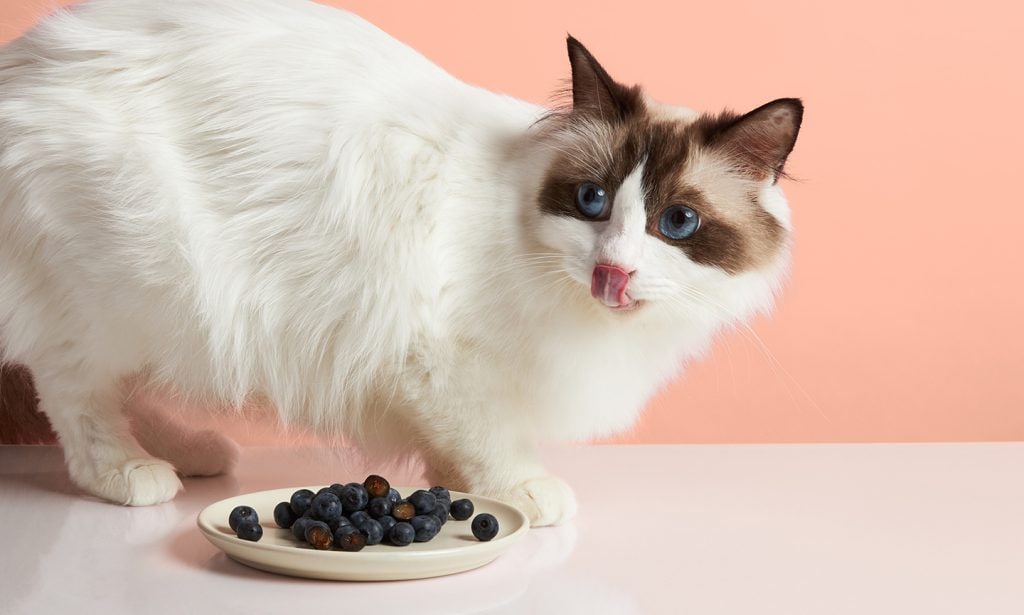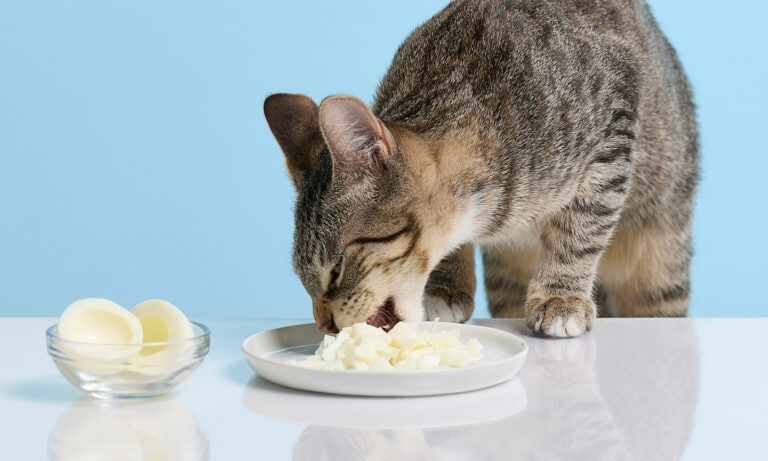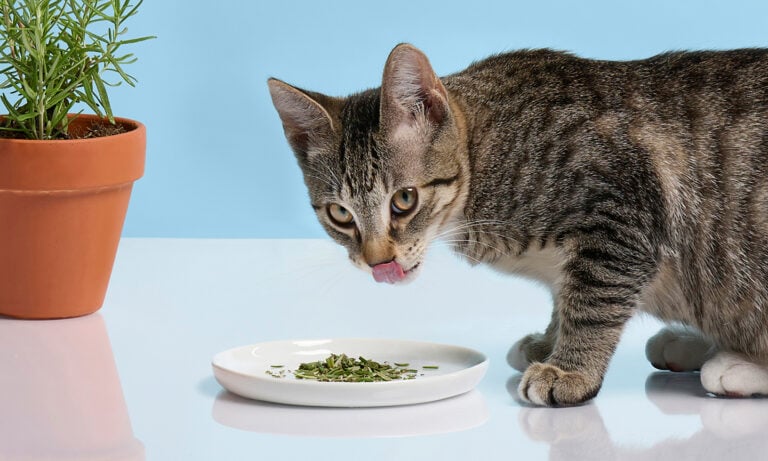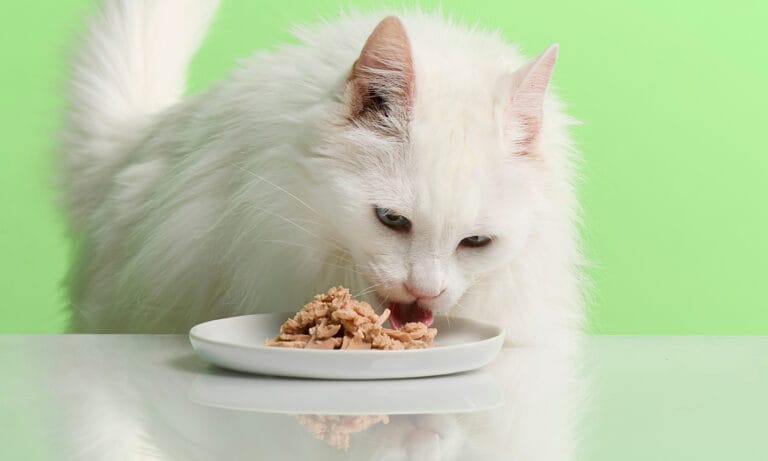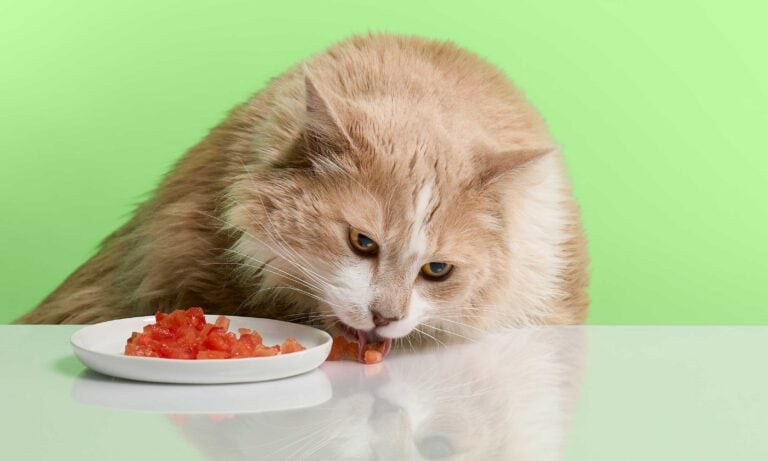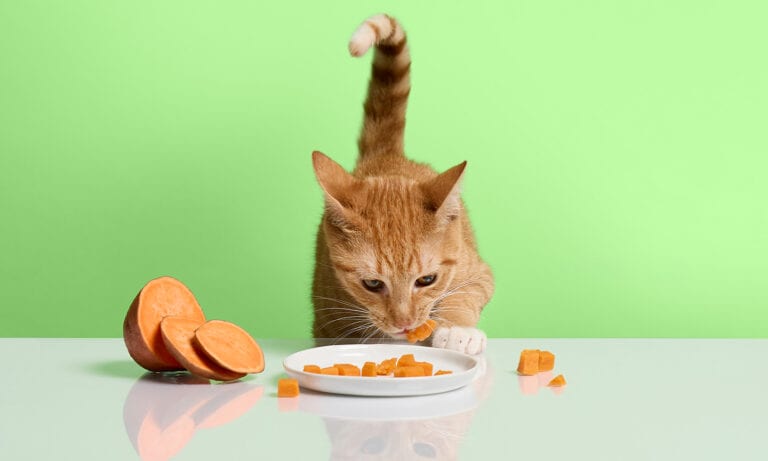
Click the buttons to jump to each section:
FAQs About Cats and Blueberries
Q:How often can cats eat blueberries?
A:Keep it as a sometimes treat, says Dr. Deborah Bayazit, DVM, co-owner and medical director of Brilliant Veterinary Care in New York City. Treat kitty to blueberries one or two times a week, max.
Q:What are the benefits of blueberries for cats?
A:Blueberries are a safe, nontoxic snack that boast health benefits when consumed in moderation by your kitty, including:
- They contain fiber, vitamins and minerals, like vitamin C, vitamin K, manganese and potassium. Plus, they contain antioxidants.
- They’re a hydrating snack. Blueberries are approximately 85 percent water, which can help keep your pet hydrated. (Never use blueberries in place of water, though.)
Q:Do blueberries have any nutritional benefits for cats?
A:"They do," says Dr. Bayazit. Blueberries are a natural source of fiber and have beneficial vitamins, like vitamins C and K, as well as minerals, like potassium and manganese. They’ve also got antioxidants.
Q:What fruits are toxic to cats?
A:The following fruits are considered unsafe for cats and could lead to negative reactions:
- Citrus fruits (such as oranges, tangerines, lemons, grapefruit, limes and the like)
- Cherries
- Grapes
- Raisins
- Avocados
Benefits of Feeding Cats Blueberries
Cats may be obligate carnivores (meaning, they need meat–not carbs–to survive), but that doesn’t mean they can’t have fruit treats from time to time. And blueberries, in particular, have several health benefits packed in, including…
- Blueberries have vitamins, minerals and fiber. They’re not only a natural source of fiber, which can help with digestion, but they also have vitamin C and potassium, says Dr. Bayazit. Blueberries are also known for being a good source of vitamin K (an essential nutrient for bone health) and manganese (which plays a role in fat and carbohydrate metabolism).
- Blueberries are high in antioxidants. The antioxidants in blueberries may promote good health effects by helping to boost your cat’s immune joint health.
- Blueberries are a safe cat treat. In small quantities, blueberries can make an acceptable, nontoxic pet food for healthy cats. Avoid feeding to cats with any sensitivities to blueberries.
- Blueberries are hydrating. Blueberries are approximately 85 percent water per cup, and although you’ll just be doling out one or two berries, they’re still a nice option for helping to keep your pet hydrated. (They should never be substituted for water, though.)
Downsides of Feeding Cats Blueberries
Though blueberries are not typically harmful for a cat’s health, they could lead to digestive issues.
The downsides of feeding cats blueberries include:
- Digestive trouble. Truth be told, too many blueberries would give anybody diarrhea–and that includes our feline friends. If they overindulge on blueberries or if their bodies don’t handle carbohydrates well (they are primarily meat eaters, after all), your fur baby might experience stomach upset and other gastrointestinal yuckies, like diarrhea, says Dr. Bayazit. The carbohydrates might just be too much for some cats.
- They may not pack much nutritional punch. Cats need meat for optimum fitness, and a treat like blueberries might get in the way of them eating a balanced diet. Plus, because they’re meant to get all their energy from proteins and nutrients in meat, if they fill up on blueberries, they might just stalk away when you show up with their regular cat food. And although blueberries clearly have nutritional bonuses, their effect may be slight in cats because of the small amounts they can safely consume.
- The sugar content can cause problems. While blueberries don’t contain any chemicals or compounds that are toxic to felines, blueberries do contain sugar. That can be particularly problematic for the following reasons:
- Sugar in a cat’s diet can lead to issues in their digestive systems and complications for overweight cats or those prone to obesity. So, don’t feed them blueberries.
- Certain medical conditions, like diabetes, are exacerbated by sugar. Cats with diabetes can’t handle sugar fluctuations well. For them, eating up treats such as blueberries can have negative effects on their blood sugar levels. For these cats, blueberries are definitely on the no-fly list.
How to Feed Blueberries to Cats
So, how do you feed blueberries to cats and how much should you feed them?
Here are some tips for serving blueberries to cats:
- Start with one or two small blueberries. “If you dish them out sparingly, it’s fine to give blueberry treats, now and again,” says Dr. Bayazit. Begin by giving your cat one berry and see if they seem to enjoy it. All cats are different: Some may not be interested in a bite of blueberry, others may try blueberries simply because they're curious and can’t resist something new, and the rest may genuinely enjoy the fruit. If your cat likes them and has no bad reactions, bravo! Adding a second blueberry into the mix would be acceptable, so long as they’re not served daily.
- Limit overall treat servings. Snacks should not take up more than 10 percent of your cat’s daily calorie intake. Let’s say your cat generally takes in 200 calories a day; well, two blueberries are about 2 calories, so that’s completely in line with your cat’s daily treat allotment at only 1 percent of their total diet. In general, two to three blueberries are an appropriate amount, but the number of berries your cat eats in a day should also depend on things like their weight, other treats they are fed and their overall health. If they eat too many blueberries, you might see diarrhea or other digestive trouble.
- Stick with raw, fresh blueberries. Remove the raw blueberries from the stem, then wash them thoroughly to help get rid of pesticides and dirt. Next...
- Before offering, cut each blueberry into bite-sized portions (about half a berry)—that way you avoid choking hazards. After you slice one open, let your cat have a whiff to see if they’re interested.
- If cutting in half doesn’t work (cats are picky, after all), try mashing the blueberry. That might make it more palatable.
- Stay away from processed or cooked blueberries. Unless the blueberries are included in foods specifically made for cats, stay away from blueberries that are processed, cooked (like in a pie or muffin) or otherwise prepared—like those in jellies and jams. These may have a high sugar content and pose more of a pet health concern than fresh berries. Also, look out for any packaged blueberries that might have been sweetened beforehand. Chocolate-covered blueberries should also never be given to cats, as chocolate is dangerous for felines.
- Avoid frozen berries. Feeding frozen blueberries to your cat is risky as they could not only damage their teeth but they could also be a choking hazard if swallowed whole.
- Watch for side effects. It’s best to introduce new treats in moderation so you can monitor any changes or problems. As pet parents are well aware, phasing in a new food can cause gastrointestinal issues in your kitty. Keep an eye on your buddy after their tastings and watch out for any negative repercussions. If your cat does fine, fantastic! Blueberries work as an occasional treat.
What Else Can Cats Eat?
Share:
